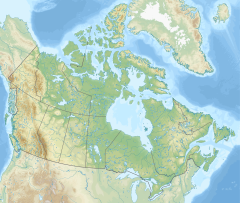Queen Maud Gulf Migratory Bird Sanctuary
| Queen Maud Gulf Migratory Bird Sanctuary | |
|---|---|
| Location | Nunavut, Canada |
| Nearest city | Bathurst Inlet |
| Coordinates | 67°04′59″N 101°44′59″W / 67.08306°N 101.74972°W |
| Area | 61,765 km2 (23,848 sq mi) |
| Established | 1961 |
| Governing body | Environment Canada |
| Official name | Queen Maud Gulf |
| Designated | 24 May 1982 |
| Reference no. | 246[1] |
The Queen Maud Gulf Migratory Bird Sanctuary is Canada's largest federally owned protected area, encompassing some 61,765 km2 (23,848 sq mi) of the Arctic Circle coastline. 6,710 km2 (2,590 sq mi) are marine, and 55,055 km2 (21,257 sq mi) are terrestrial.[2]
Under the terms of the Ramsar Convention, it was designated as a wetland of international importance in 1982. It is the world's second-largest Ramsar Site.[3] The majority of the park is lowlands and countless streams, ponds and shallow lakes. The land is mainly Arctic tundra and marshes.
In 1982, 450,000 geese, including the majority of the world's Ross's geese, nested in the sanctuary, one of the largest concentration of geese on Earth.[2]
The protected area was established in 1961 under the Migratory Bird Sanctuary Regulations of the Migratory Birds Convention Act of 1917.[3] It was named for Queen Maud of Norway.
Threats
[edit]There are no current threats as it is a federally protected land mass.
See also
[edit]References
[edit]- ^ "Queen Maud Gulf". Ramsar Sites Information Service. Retrieved 25 April 2018.
- ^ a b Area of the Park and Significant Facts about Canadian Protected Areas Archived June 20, 2009, at the Wayback Machine
- ^ a b Facts about QMGMBS Ramsar Site by Environment Canada Archived March 27, 2009, at the Wayback Machine

